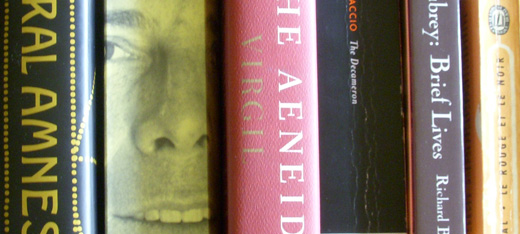WednesdayMorning Read
¶ In the Decameron (IX, iv), an anecdote rather than a tale, involving actual Siense gentlmen, contemporaries of Dante: the two Cecchi, very dissimilar men who were united only in their given names and their hatred of their fathers. The story will put readers of a certain vintage in mind of Eddie Haskell.
¶ In Aubrey, two Lives: Ben Jonson and Ralph Kettell. The second gent, who served as the second President of Trinity College, garners quite a few more pages than rare Ben does. Of the latter’s celebrated career, Aubrey write “I need not give any account.” Whereas Kettell, who would have been lost to time, emerges very clearly as a sort of gangly Monty Woolley, born at forty, more able administrator than scholar — an amiable loose-leaf with regard to everything but discipline. And the quality of the beer at Trinity, which was so excellent that the scholars “could not go to any other place but for the worse.” Surely another college president must have given Kettell’s theory about excellent beer a try — surely?
¶ Returning to Merrill, dipping into the “Previously Uncollected Poems” at the back of the book. From “En Route”:
Tank dry, this eerie, by now selfless power
Was bearing me beyond
The windblown kids with signs
Upheld in hope: New Haven, Providence …
Their mouths worked. But a wand
Had grazed me. On I drove
Under the curse or blessing of no love.
¶ In Le rouge et le noir, I gallop through the final titled chapters toward the finale. That leaves four to which Stendhal couldn’t be bothered to affix titles. Once I’ve done with them — I already know what’s going to happen — I shall read the introductory material with hopeful interest, in search of an explanation for Stendhal’s manifestly fading interest in this project. Could it have been the tumult of the Revolution of 1830, which replaced one branch of Bourbons with the other? More anon …
¶ Clive James, rather briefly, on Nirad Chaudhuri, according to him the “most distinguished” Indian master of English prose. I have added Chaudhuri’s The Autobiography of an Unknown Indian to my reading list.
Chaudhuri’s prescience was about a future that had not yet happened, and is happening only now. By the mere act of writing such a richly reflective prose, he suggested that a civilization continues through the humane examination of its history, which was its real secret all along.

